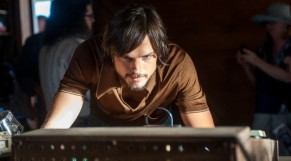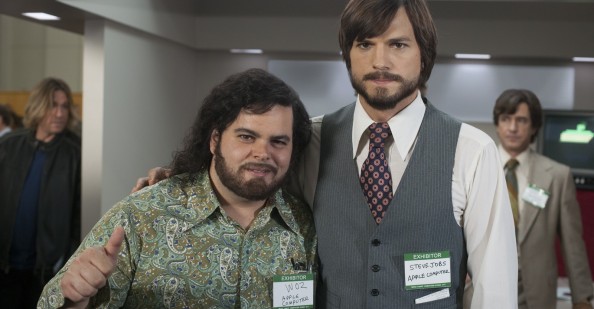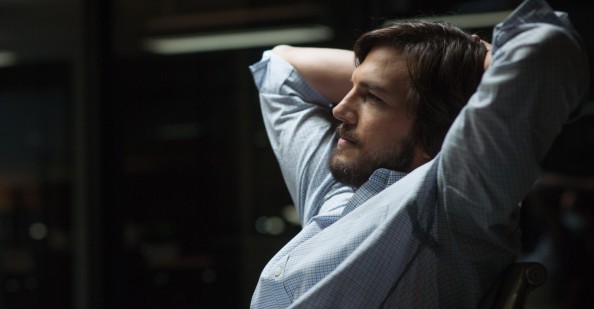Ashton Kutcher was still channeling Steve Jobs at the Teen Choice awards last Sunday. The “Jobs” star, the recipient of the Ultimate Choice award, extolled values he credited to the Apple co-founder. (Josh Gads, who plays a sympathetic and sensitive Steve Wozniak in the biopic, presented Kutcher with the award.)
[springboard type=”video” id=”768661″ player=”tmbg001″ width=”599″ height=”336″ ]
In his acceptance speech Kutcher gave three tips. First he spoke about the value of hard work. He said he was never too good for any of his jobs, including his first, hanging shingles with his dad. His second bit of advice – which got the most applause – was about being sexy. “The sexiest thing in the entire world is being really smart,” Kutcher said. I’m not sure the screaming audience members listened to the rest of the sentence, where Kutcher said, “Be smart. Be thoughtful. Be generous. Everything else is crap.”
Finally, Kutcher said, “Steve Jobs said that when you grow up, you tend to get told that the world is the way it is … everything around us we call life was made up by people who were no smarter than you. And you can build your own things. Build a life.”
At the press conference for “Jobs” recently in Manhattan, Kutcher, along with director Joshua Michael Stern, talked about the challenge of portraying the Apple co-founder realistically and honestly onscreen. (Aaron Sorkin, who optioned rights to the Jobs’ story inspired by the Walter Isaacson biography, is working on his own movie version.)
The box office for “Jobs” has been lackluster so far – a little over $9 million on a $12 million budget – which doesn’t diminish how hard Kutcher worked to personify and recreate the digital age hero. He ate like Jobs, which landed him in the emergency room. He walked like Jobs. Most importantly, he tried to channel his creative process.
Below are edited highlights from the press conference:
Was there anything you were surprised to learn about Jobs?
Stern: I was surprised about that the man who gives all these keynote speeches we’ve all associated with being such a beautiful eloquent speaker, that when I interviewed people who were on the very first early Mac team, they talked about how difficult it was for him to explain things… Because he tried to tell them things that hadn’t existed yet and that’s there was no point of reference so he had an image and a picture, but he was trying to find the words to articulate something that wasn’t there … I was fascinated that the young Steve struggled with explaining.
Kutcher: The thing that I probably least expected to find was his perspective on education. I found this speech that he gave when he was about 25 or something and he was speaking to a bunch of high school kids that were about to graduate, and he encouraged them – apparently there’d been a couple of other speakers right before him, and all these kids were preparing to go to these great schools – and Steve got up in front of them and said, you know, a lot of the really successful people that I know in the world, they didn’t go to school, and they didn’t get a degree. They had a broad set of life experiences that enabled them to bring something valuable that people with a standardized education couldn’t bring and to encourage these kids to maybe go to Paris and try to write poetry for a while or fall in love with two people at one time or try LSD like Walt Disney did when he came up with the idea for “Fantasia,” and that maybe this standard education wasn’t the greatest means to creative solutions but rather a diverse set of experiences in life could be the greatest education that you could have. And I found it to be very surprising that that would be his opinion, and I think it was an opinion that he carried and reiterated throughout his life, and I think it’s a valuable one.
Jobs comes across as a visionary but not much fun to work with. Did you ever meet him?
Kutcher: I never met him. I have a lot of colleagues and close friends who did. I have a lot of friends that considered themselves friends with him and admired him. I too admired the work that he did.
One of the first things you learn as an actor is to never judge your character. We as human beings are flawed and most of the time the decisions and choices that we make at the point in time when we’re making that decision we feel like we’re making the right decision or the right choice and we feel like we’re behaving in the right way, in a justified way, and so there were some things that Steve Jobs’ approach seemed very blunt and unkind, however, it was that same blunt discernment that allowed him to create the amazing products he created. It was that same demand for perfection and demand for people to elevate their game to the best of their ability that allowed these teams to actually create these products that we all take for granted.
What are some of the ideas you want people to leave this movie with?
Stern: Everybody has a dream. Everybody has an idea… this is the time and the period where more than ever I think people need to reach in and self motivate and create companies… It’s going to be the new norm in the next 50-60 years and so for me I think there’s never a better time or has been a better time for a story about a man who created the world’s biggest company in a garage 30 years ago… which where is where we all start. … Blue-collar parents, he worked in a garage … and that’s a lot of what Ashton’s is doing with his other world, an entrepreneurial world where people are trying to do that.
AK: I wanted to make this film to inspire young people to create the world that they live in. And I think that was an ethos of Steve Jobs. Kids are graduating college and there’s no work force and there are no jobs that they feel are equivalent to their level of education, and I’m personally kind of tired of people looking at the world and saying, ‘the world is not providing for me.’ Maybe you need to provide for the world and maybe it just takes that little bit of confidence to say, you know this guy who came from very meager beginnings and didn’t have a college education was able to build the most powerful company in the world, and I think that that is inspiring and necessary right now and I think that people can learn a lot from that.
And I also think that another ethos of Steve Jobs that I think, even people that are running companies today could learn a lot from, you know Steve even when Apple became this gigantic, incredible company that was driving massive value to shareholders, he was never beholden to the shareholders; he was beholden to the consumers. And he was beholden to the innovation in an effort to make their lives better and by proxy he made the shareholders a lot of money, but he was never going, we need to make this company more profitable.’ He was saying ‘we need to make something that’s even more brilliant and more beautiful and more wonderful for people’s lives… Steve made life beautiful. He didn’t just create a business and a product that was a utility that worked. He made something artistic. And he made something beautiful and he appreciated art and creativity, and I watch schools today and education programs dumping art programs for these business programs, an I remember that the most powerful company in the world was run by an artist and that was Steve Jobs.
On a lighter note, how did you manage to embody Jobs’ walk? Did you walk around without shoes for a while?
 AK: I wanted to honor this guy and because I knew people that knew him I had pretty good insight into who and how he was and because he’s so well documented I kind of couldn’t afford to not resemble him. I started by learning everything I could about him by reading books and watching videos and listening to people tell tales and stories, and the script that was an extraordinary resource. And then I started consuming the things that he consumed. I started studying the entrepreneurs that he admired and listening to the music he listened to and eating the food he ate and walking the way he walked.
AK: I wanted to honor this guy and because I knew people that knew him I had pretty good insight into who and how he was and because he’s so well documented I kind of couldn’t afford to not resemble him. I started by learning everything I could about him by reading books and watching videos and listening to people tell tales and stories, and the script that was an extraordinary resource. And then I started consuming the things that he consumed. I started studying the entrepreneurs that he admired and listening to the music he listened to and eating the food he ate and walking the way he walked.
I went for hikes with his employees. He’d go for a walk when he wanted to have meeting with someone and so I just started doing that, started walking without shoes on, wearing Birkenstocks and going to one-hour walks every day, trying to walk like he walked. First it was five minutes, then it was 10 minutes. You know you practice something you get better at it.
Listen doing that kind of thing and making those kinds of changes to your body is a shock. You know when you’re not used to eating a certain way and you all of a sudden change your diet it changes your body and your body reacts to that. At first it rejects it. Your body rejects walking the way Steve Jobs walked because you’re physiologically built to walk the way you walk and every human being on this planet has a unique gait that we could actually measure and quantify and use it as a security code if you wanted to. And your body actually has to rebuild to walk that way and it was uncomfortable but I think it served a purpose.
Stern: But I have to say that it’s funny because Ashton, way after the fact, realized I took my first meeting with Ashton, I already felt that he was channeling Steve. He had done so much research, his mannerisms, he was already playing with physicality … and on our second or third meeting, he’d say, “Let’s take a walk.” And we did, and I was wearing dress shoes I think at the time. And I had no onset that’s what Steve used to do … We’d take these long walks and we’d talk about the character.
It wasn’t too much later that I realized that he was just living the character. He lost 15 to18 pounds for the beginning of this film and if you see, where Steve is at the beginning of the film, how emaciated he is, and then Ashton sort of gained weight because we were able to shoot chronologically. It was a tremendous amount of commitment. And he went on a fruitarian diet. He ended up having to go to the emergency room right before we started shooting just because you know to sort of immerse yourself in Steve Jobs is a intense thing and to live in that skin so I would call him every once in a while and just say are you sure you’re okay, you know, in there (laughter) and that’s kind of what the process what but it took a lot of commitment.
How did you end up in the emergency room?
AK: I went on this fruitarian diet and I read a book by this guy Arnold Ehret, which was a book that Steve read called “The Mucusless Diet Healing System” and it was kind of his dietary bible, if you will, and it talked about the value of grape sugar and that that was the only pure sugar that you could have in your body and I think that the guy that wrote that book was pretty misinformed. My insulin levels got pretty messed up and my pancreas kind of went into some crazy, I don’t know, the levels were really off and it was really painful. I didn’t know what was wrong. And we figured out that my insulin levels were really off. (Ehret, born in 1866, died at age 56 after he fell, possibly as a result of hunger, and cracked his head.)
You mentioned Walt Disney, who else would you like to portray on screen and why?
AK: I haven’t really thought about it. This character was a great opportunity for me. It was kind of a perfect convergence of my personal interests and my craft and also a really complicated person to play. He was an anti-hero. He’s a flawed hero and it’s fun to play flawed heroes because they feel more real and they’re relatable and it makes you feel better about your flaws.








